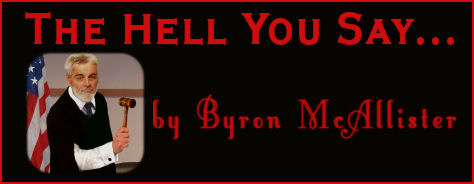 |
Your “Normal” Words and My “Vernacular”
Working a puzzle, the other day, I came across a place where “Korea” was used as an exact homonym for “Career.” Readers who live on the east coast of the USA may see this as normal, due to your habit of eliding final r, but for me it was a tip-off that the guys who make that puzzle do not live out here (or, at least, didn't start out here) in the west, where every single r is pronounced every time. (My wife proof-read this, and reminded me that even in the west, many pronounce February as if were spelled Febyuary. Okay, okay.) The same puzzle-makers also revealed their native speech patterns when they used “whacks” as a homonym for “wax.” Whar' I cum frum, they ain't homonyms, because we always pronounce the h-es in our wh-es (albeit we put them before w, rather than as written), unlike you easterners who think witch and which are homonyms, along with wear and where, what and watt, and so on. Not too long ago, I was tripped up on my ignorance of how you non-west guys talk when my editor insisted that a word I'd spelled “Woops!” should really be spelled “Whoops!” She lives in Maryland, and I live in Montana, and we speak very closely related languages, but no westerner could use an h in spelling a word that sounds like “woops.” It'd make it too much like the initial syllable of “whoopee,” an acknowledged cowboyism, never duded down—out here, anyway—to sound like “woopee.” (Our compromise was to use “Oops!” spelled and pronounced alike from east to west. Questions on the ambiguous pronunciation off the double o didn't arise, thank goodness.) Still mysterious to us western types is why easterners don't drop the h in “who” and say it as “woo.” Maybe in some areas it happens? Whaling (for me not a homonym for “wailing” Should I have stuck with “flogging”?) away at the same dead horse, there's the aw, vs. ah matter. It's been at least sixty years since I first slammed up against that one. I was reading a book that offered me insights into the Russian language, and it contrasted the Russian (hence Cyrillic, but I don't know how to get Cyrillic letters in here) “a” with the Russian “o.” The former, it said, was pronounced like our “ah,” and the latter like our “aw.” This meant nothing to me since throughout my then exclusively Utah and California life I'd pronounced the two alike. To clarify matters (still uselessly for me), it mentioned the a in father and the aw in saw. Big deal! I also pronounced those two alike. Okay, I finally figured it out, though it was only recently that I learned, listening to a professional linguist, that I'd just been using standard California “talk” (which, for me, used to rhyme with tock, not almost with toke). Actually, I was gonna advocate using these dialectical differences as clues in a detective story, but the more I think of it, the more I wonder if they wouldn't be too subtle for most American readers. My editor and I had some difficulty over woops and whoops, and if the plot hung on that matter, maybe one or both of us would fail to see the point. Still, you may be smart enough to make it work. After all, Ellery Queen several times got away with hanging plots on subtle differences between UK and US spelling. I'm still trying to decide whether I could do it myself, or whether I'd first have to become expert in English language dialects, distinguishing warsh from wash, cah-fee from caw-fee, and so on. I already know that I'm in trouble with slang, which no longer even resembles the slang we were encouraged not to use, back when I was a kid. (And yet, when I use “peachy-keen” or the more abbreviated “peachy,” it's really rare that I get a funny look, even though the linguist I mentioned earlier assured me that “peach-keen” is at least as obsolete as “it's the bee's knees.”) |
|
|
Past issues and stories
pre 2005.
Subscribe to our mailing
list for announcements.
Submit your work.
Advertise with us.
Contact us.
Forums, blogs, fan clubs,
and more.
About Mysterical-E.
Listen online or download
to go.
|
|
|
 |
 |

